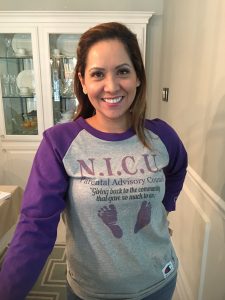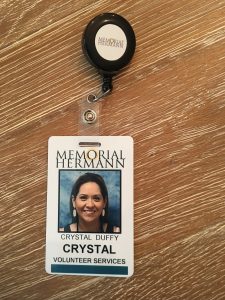
Before my twin pregnancy with my daughters, Katie and Lauren, I had never heard of the NICU. It never crossed my mind to think about this critical space, in the secluded part of the hospital, where most people don’t see and where medically fragile babies are cared for. This was not how I envisioned my motherhood journey would go.
During our 38-day stay in the NICU, I felt as if I gained the same in-depth knowledge as a resident in neonatology. My world revolved around Kangaroo care, bilirubin lights, surfactant, residuals and poop-inducing glycerin drops. I inserted myself, sometimes even obnoxiously, into our girls’ care. I asked questions everyday and kept a diary tracking our progress and celebrating every milestone. Despite being engaged in our girls’ care I always felt I needed more emotional support than my nurses and doctors could offer. I longed for someone to talk to. Someone who truly understood the pain of leaving your baby in the hospital. Someone who understood the fear and complicated shame that came with having given birth to preemie babies. And someone who understood the consuming guilt from not spending every moment at the bedside.
Two years after Katie and Lauren were discharged from the NICU, I was invited to become a part of the newly formed NICU Parent Advisory Council, which is a quality improvement collaboration between UT Health professionals and Children’s Memorial Hermann Hospital NICU staff. We are funded in part by a grant by the U.S. Department of Health and Human Services. Each member of our council sits on different committee meetings and provides parent perspective on quality improvement initiatives. Our council has strived to work on quality improvement initiatives as well as support the NICU family community. We have felt a void in being able to provide a parent to parent support program for current NICU families.

Through my work as a parent advisor the last couple of years I’ve learned that NICU parents are often as fragile as their babies. While it may not be as obvious on the outside, they require patience, guidance, support and encouragement to ensure that they are mentally, physically, and emotionally prepared to endure the pressure of a NICU stay and to ensure that they are also able to meet the on-going needs of their medically fragile baby post-discharge.
Research studies have shown that parents with infants in NICUs are well known to be at increased risk for postpartum depression, post-traumatic stress disorder, and anxiety. The NICU creates barriers that make it difficult for a parent to bond with their baby. In addition, each of these conditions further disrupts parent and infant bonding. A strong positive healthy bond is critical for a child’s emotional, intellectual and physical well being, as well as the parents. Studies also show that offering psychosocial support and peer-to-peer support by former parents has been beneficial for current NICU parents.
This year our parent advisory council established our first quality improvement project. We knew we wanted to offer informal psychosocial support for the current families in the NICU to empower them in their roles and support their families during their NICU journey. We wanted to determine the best way to provide this support so we created a needs assessment survey. The survey asks families to think about if parent-to-parent support were offered what would they want that support to look like? Would they want a group setting or one-on-one discussions? Would they want in-person support at their baby’s bedside or a text message at night after they’ve gone home? All these things are addressed in our needs assessment survey, which we offered in English and which I translated into Spanish to best meet the needs of our diverse community. I’m looking forward to getting the results of the survey back. Once this assessment is complete, our council can determine the model to adopt and begin preparations for this new parent-to-parent support initiative.
The NICU is a special place with an incredible group of healthcare professionals, who care for these precious medically fragile babies as if they were their own. The NICU is also a place that houses the worst and happiest moments for families. I feel so blessed that I get to use my experience to help other families. To have experienced a traumatic pregnancy, birth, and NICU stay and now being able to turn it around and give back to families in need of support and love, is the greatest gift.

